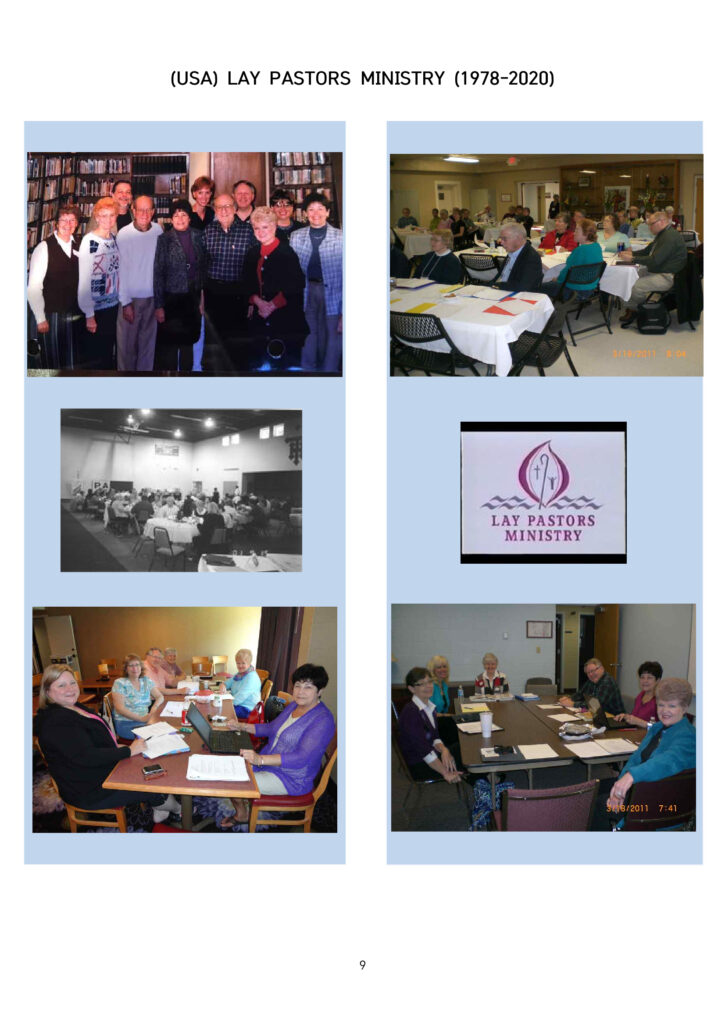#43

“I wouldn’t do that for a million dollars!” said a friend to one who was telling of her experience as a Lay Pastor.
The Lay Pastor’s response? “Neither would I!”
 Pastoring for money is ruled out as an acceptable motive by Peter who called lay people to be shepherds of God’s flock, “not because of greed for money, but because of eagerness to serve.” (I Peter 5: 2, 3).
Pastoring for money is ruled out as an acceptable motive by Peter who called lay people to be shepherds of God’s flock, “not because of greed for money, but because of eagerness to serve.” (I Peter 5: 2, 3).
What, then, keeps lay people pastoring once they have started? Especially since there are discouragements, rejections, demands on already scarce time, and failures. These are the major reasons for keeping at it:
- Alert to God’s call to be a Lay Pastor/Shepherd. What committed person can say “No” to God?
- Desire to serve one’s church.
- Encouragement from the clergy and other brothers and sisters who also pastor. Gehard Frost quotes an unknown speaker in his booklet “What In The World Are We Doing?” who say, “the reason mountain climbers are tied together is to keep the sane ones from going home.” There are times when all of us would quit if it were not for being tied in with others doing the same thing.
- The sense of fulfillment which excites as person when he experiences being a blessing, inspiration, and help to another – being “love with skin on”.
- The conviction that what you are doing is significant. God calls you to do it. The Spirit has given you the gifts for doing it. Your church needs it done. Your people need you whether they all acknowledge that or not. You are pastoring people. And pastoring has a significant importance, Biblically and historically.
- Wanting to hear Jesus’ word, “Well done good and faithful servant”, on the day of His appearance. Or, as Peter put it, “You will receive the crown never fade away.” (I Peter 5:4) Doing what you are doing with an eye toward the future generates adequate intrinsic motivation to keep at it.●
-excerpted this from the Network News, LPMI USA
(January 1988, First Issue, p. 5)
COMMENTS
in relation to What Keeps You At It?

Byeong, Melvin University, says:
I remember that once Dr. Melvin told me, “money is interesting.” I thought he is also wrestling with financial difficulty (not sure, just my guess)…I remember that I told him about our difficulty of finance to manage LPM Institute in Korea, so he agreed with me. (Maybe this is more correct).
Melvin mentioned of I Peter 5: 2, 3; …“not because of greedy for money, but because of eagerness to serve.” Melvin, here, compared money with eagerness. It’s not easy to make money. We have to work hard to make money, so when we are doing ministry, we have to work hard as people work hard to earn the money. We may say this way, work hard for money? or work hard to do ministry? which means helping people and helping churches.
Melvin show us the reality in ministry: “once we are doing ministry, definitely there are discouragements, rejections, demands on already scare time, and failures.” I think to overcome these pains we have to keep on going (This is my understanding, even looks like a little slightly different prospects from his own intentions, anyway). Lets take a look followings.
Then he gives us some reasons for keeping at it: 1) he mentioned we need to recall of callingness from God. Sometimes we are discouraging once in a trouble, then we need to remind of our callingness, whatever our situations are –sometimes family difficulty, personal disappointments, etc. names of a few – Calling is unchangeable truth.
Desiring means “wanting” in my paraphrasing. In the other place, Melvin said we have to “wanted” to do God’s ministry. Are you wanting to do it? Really want to do it? We have to answer YES. It should be definitely positive response. If we are not wanting to do it, there will be problem. Of course sometimes we don’t as you understand, but…once we have positive answer on that, we can keep on going gladly.
It’s also important to encourage each other: clergy to clergy and laity to laity, and in any way with one another, with others those whom involved in, related people in ministry. Melvin illustrated the mountain climbers that why they need to tie together each other. I don’t have those climbing experiences but to enjoy talking with our staff members even to a tiny, trivial things. If we were not being tied with others, sometimes with family’s problem, the problem will be into more trouble. Especially one family has in troubles, problems we need to tie more than ordinarily daily lives.
I would better say here, tie together and pray together should be goes in hands, not only prayer but also tie together is more making lightly our burden, pains as we all experience it.
Sense of fulfillment is also necessary to keeping at ministry. Without fulfillment, we will be disappointed, so we need to learn how to complete the task which was given by God. That’s why we need short-term vision and execute, and focus on there until to complete. Our energy is growing from 1 to 10, not 10 in the one morning. Start from 1, which is small thing, small idea, small insight, then our energy, our skill, our competence are growing more and more.
Melvin mentioned, “Significant.” What we are doing in any ministry should be significant. Significance is important in our lives. That why the author of Halftime, Bob Buford, meant Significance than success. Of course he said there are “first-half” which focused on the “success” (up to 40 years old?); and “second-half” (after 40 years) should be stress on the “significance” in our lives.
Melvin added pastoring has a significant importance, Biblically and historically. Pastoring is the main topic of this ministry. We already know why it is. I want to say again that pastoring is the people-oriented ministry and on top of that Lay Pastors Ministry is done by lay people, that’s why it is more important and significant in the churches today ever than before.
FOOTNOTES
So, what keeps me (Byeong) at it? I retrospects again at this moment.
I have a little difficult when to start School in Korea. We, LPM Korea, thought that LPM School has to be in the world. If it is in the States, it’s the best. If so we don’t need to make another one. But they don’t have it, so its burden came to my shoulder. I don’t know why. Maybe God’s Will….maybe God needed LPM/PACE School in the world. Anyway PACE School for now is Nagaland India by God’s grace. And I was thinking always how to keep on this ministry going continuously even after Melvin’s departure in this earthly world. That was why my original intention to make school. “If he dies, will this ministry keep on going in the States?” was my question all the way last many years. So if we want to do this ministry permanently, it should be school. That’s my conclusion.
Practically how I have continually stayed in this ministry? I have helped churches and they wanted me to help them afterward, it makes me at here more than 15 years. And also I have seen the LPMI USA that they have done more than 30 years. It also challenged me to stay at here.
Probably another reason that is compelling from God? Something have stirred in my mind all the way, and it makes me to say here and keep on going. Working good or not, even big progress or small step, still keep me on going.■
 Dr. Ron Mayforth, Canada, said,
Dr. Ron Mayforth, Canada, said,
All of us can remember special moments in our lives when someone went out of his/her way to speak a word of encouragement to us. The encourager validated our worth. To affirm another is to speak or act positively about another and to another.
Unlike flattery, we share the truth with another for the other’s benefit, not for our hoped for “gain on investment.”
In our world of stars, superstars, and applause, we are often tempted to give this gift only at times of good performances. How wonderful it is when a caring person has learned to celebrate more the areas of our existence –
⦁Our person is affirmed – our character, faith, beauty, strength, personality, intentional choices, wisdom – our irreducible worth in the love of God.
⦁Our potential is affirmed – others become talent scouts who help us discover, value, and develop our potentials – inherited, spiritual, and acquired.
⦁Our progress is affirmed – we are often too close to ourselves to see or appreciate our growth. How encouraging when someone comes along to celebrate the smallest step toward growth.
⦁Our passages are affirmed – someone shows up at just the right time to celebrate the completion of an important milestone – a birthday, graduation, promotion, wedding, birth, anniversary, a vocational success, the conclusion of a ministry, the presentation of an award, retirement, etc. We all need a few cheerleaders who help us savor our success and go on to the next challenge.
⦁Our performances are affirmed – how good it is to hear, “You lead well, spoke well, sang well, prayed well, served well, listened well, care well, etc. When you do what you do it brings meaning and joy to so many. Keep it up. I love you – God loves you.”
Jesus gave affirmation. He often confronted persons honestly, but He commended them generously. To the Apostle Peter he said, “You are now shifting sand, but further down our faith journey you will become ‘Rocky 1’. I’m going to build something enduring and big on your person and faith.” The Apostle Paul gave affirmation to infant, struggling churches, “when I watch your faith, growth, and service, I jump for joy. You are my trophies, my rewards.”
We all can give affirmation. A pastor friend of mind was stricken by the crippling effects of an aneurysm. His ability to remember and speak were greatly reduced. He had to .leave the pastorate. On the phone, he suggested to me that we probably wouldn’t see each other again. He could not say those words anymore (preach and pray). He would not move around in clergy circle anymore. He could not perform as before. I was stunned. I felt some of his loss and grief. I assured him of our love and friendship. A certain level of performance doesn’t put a dent in that. I admire his successful adjustments. We rendezvous every other year to renew and enjoy each other’s love. We affirm others in many ways –a face–o–ace word, an email, a note in the mail, a phone call, a timely gift, a surprise, a party, a ceremony, a hug, a smile, a tear, an applause, a prayer, a visit.
Caring persons are ever learning how to affirm in sincere and creative ways. You’ve done it before. Do it again, soon, often. We have God and HIS love in us!
 I tried to help more than 150 churches with this ministry. This ministry, as you see that, is a relationship between laity and their pastor. Of course not exclusive for the whole congregation, in some way all of them included in this ministry, they see it, taste it, and involve it. The issue that I found here is not easy job for pastors; accurately they are senior pastor at particular local church, not general pastors at any place. They are the people who are in charge of this ministry. I mean they are top person to decide major things in this ministry. Of course there is some level to take care for this ministry. Melvin called it, Ministry Leadership Group (MLG) those who are responsible success or failure of the ministry. Mostly 4-8 laypeople among lay pastors, because others done know about this ministry. And in the other case, mean at large church, associate pastor is in charge of this ministry, but they are only managing this, not doing ministry itself. Even these responsible levels are there, but the very top person is senior pastor. They decide major things, for instance to adopt this and adapt to their church.
I tried to help more than 150 churches with this ministry. This ministry, as you see that, is a relationship between laity and their pastor. Of course not exclusive for the whole congregation, in some way all of them included in this ministry, they see it, taste it, and involve it. The issue that I found here is not easy job for pastors; accurately they are senior pastor at particular local church, not general pastors at any place. They are the people who are in charge of this ministry. I mean they are top person to decide major things in this ministry. Of course there is some level to take care for this ministry. Melvin called it, Ministry Leadership Group (MLG) those who are responsible success or failure of the ministry. Mostly 4-8 laypeople among lay pastors, because others done know about this ministry. And in the other case, mean at large church, associate pastor is in charge of this ministry, but they are only managing this, not doing ministry itself. Even these responsible levels are there, but the very top person is senior pastor. They decide major things, for instance to adopt this and adapt to their church.
So he has to know PACE very well (simple level), and also has to know LPM (comprehensive) if he wants to do this more effective in his church. But mostly are not understood well, and not lead properly. The difficult was that they have old-mind set, which means they had old-habit leadership style. Old-habit? Kind of very centralized leadership, but this ministry is not working with that kind of leadership. This ministry is to let them (laypeople) do, it means give them freedom to do their ministry. If pastors are thinking that this is their original ministry but sharing them to help pastor’s ministry is not proper concept for working at all.
To think well it is laypeople’s ministry and now returning to them because laypeople are called, gifted and equipped, so pastor has to believe this concept and also believe the laypeople themselves. If pastor don’t believe it laypeople couldn’t do it properly or effectively. So pastor’s leadership need to be changed that to mobilize them, help them, and equip them to do better than before, and have them grow and mature to the fullness of Christ.
And also they have to know LPM and PACE more in details if they want to success this ministry because we found that most failure of this ministry is due to lack of enough knowledge and lack of understanding of senior pastor in this ministry. So to speak, they don’t know exactly what it is, how to guide and lead of this ministry. I tried to help churches last ten years with this ministry, of course mainly I visit them and train their pre-lay pastors, LPMI USA is also doing same style thus, senior pastors improve themselves rather than only rely on our Institute too much, if over-relied on to us there, they become weak themselves in developing their leadership and management skills.
ADDITIONAL COMMENT
by BYEONG
Monthly meeting of pastors, ministerium: The monthly or bi-monthly gathering of pastors, that is, the meeting of pastors, is termed [ministerium.] This originated from Ephesians 4:11-12, and is a key concept of the lay ministry. In the 1970s, Lutheran theologian Oscar Feucht wrote the book “Everybody a minister,” which means that “anyone whoever hold Christ in their heart is a minister.” He also emphasized, “those who hold the Gospel in their hearts also have own ministry.”
At that time, only the pastor was considered a real minister, so it shocked to lay people, especially to the pastors. While I was also talking with pastors, they said that they liked everything, but it was still uncomfortable to accept laypeople as partners in ministry. It was an era in which the idea that laypeople were still one step below, inferior, was dominant. Anyway, Oscar Feucht emphasized the new term MINISTERIUM in that concept. In other words, the church is called “ministerium,” a group of pastors and whole congregation. In other words, all the laypeople gathered on Sunday should look around the whole people and shout, “We are all ministry team with the pastor, “ministerium.”
This eventually played a major role in developing the concept of ‘partners in ministry’. For example, Dr. James Gallow, who was a pastor at the Skyline Methodist Church in San Diego, became famous for writing a book called “Partners in ministry” which was from his Ph.D. dissertation at Drew University in New Jersey. Because he wrote the dissertation as a study by John Wesley, and then he made and published a book based on it. In the book, he emphasized that pastors and laypeople should be co-workers in ministry. That’s why it gave the whole of the United States a fresh concept of partnerships in ministry.
For example, there is the Frazer Methodist Church in Alabama, USA, and Sunday schools are known to gather the most. It is said that there are 6,000 church members and 4-5,000 children at Sunday school. John Mathison, the church’s pastor, was named the “best pastor of the year” a few years ago. (The Church of America seems to select and present “The Pastors of the Year” in every year.) I’ve been to a few conferences within the church itself, and every year, their major theme was “Everyone in the Ministry,” which is the concept of partnerships in ministry.
The idea of a partners in ministry is a very good one. A church in Gangnam, downtown Seoul, is famous for its “discipleship-making,” which is well known to Korean churches and even Asian churches. However, I heard that from a while ago, they put up the slogan, “A partners in ministry.” Although they became a disciple, but it seems that they were eventually upgraded to a “Partners in Ministry.”
More than 20 years ago, a conference of lay ministry was held at Hallelujah Church in Bundang, and the main speaker were Pastor Ok Han-heum and Pastor Kim Sang-bok. Pastor Ok Han-heum wrote a book called “Called to Awaken Laity” and Pastor Kim Sang-bok was running the “Lay Ministry Academy.” In the end, the direction of the speeches were that both of them had to accept [the layman as the partners in ministry]. The lay people, who had been known only as consumers physically, and showed the possibility of becoming ministers and partners with the pastor in serving of the Lord. Since then, the Korean church has grown with many changes in the position and role of laymen, so I am grateful, and I remind myself once again that both pastors and laymen become a good team, ministerium, in ministry together.

믿음에 추가되어야 할 것들
평신도목회 입장에서 보면, 우리는 구원받을 때 동시에 사역에로의 책임도 함께 받는다는 것이다. 즉 동전의 양면과 같이 구원/사역 이라는 것이다. 구원은 [믿음]으로 된다는 것은 다 안다. 문제는 사역이란 어떤 것이며 어떻게 하는 것인가인데, 우선 그것은 은사와 관련이 있다. 즉 받은 은사를 따라 사역을 하는 것이 최상이라는 것이다. 은사를 주심은 사역을 하도록 하는 것이다. 그 사역이란 사람들, 교회, 세상의 유익을 위해 하는 것인데, 무보수의 일이라고 말할 수 있겠다. 돈을 벌겠다고 하는 것은 사역이 아니라고 본다. (사역과 직업의 차이)
구원은 간단한 것이지만, 반면에 사역은 여러 가지로 고려할 측면이 있는데, 멜빈목사님은 사역을 할 때에 “무엇을 어떻게 할 것인가?(DOING)” 보다 “어떤 사람이 되어야 하는가(BEING)”에 더 강조점을 두었다. 즉 “What we are!” 와 “what we do!”라고 바꾸어 말할 수도 있겠다. 즉 사역을 잘하고 장기적이 되기 위해서는, 분명히 양적인 것과 더불어 질적인 것도 갖추어져야 한다는 의미겠다. 한마디로 사역이 더 효과적이고 장기적인 되기 위해서는 믿음만 가지고는 부족하다는 것이다. 이 두 가지를 심도 있게 생각하신 것 같은데, 미국에서 30여 년간 사역하시면서 느끼신 것이 이 부분이 아닐까 추측도 해본다. 믿음만으로 다 된다고 생각하시는 분들이 있는데, 그것은 개인적인 구원을 의미하기도 하겠거니와, 질적인 개발이 그렇게도 필요하냐면서, 사역을 너무 쉽게 생각하는 것 같다. 그러니 사역을 시작은 잘하지만, 단명하는 경우가 다반사이다.
그러면 우리는 어떤 사람이 되어야 사역에서 효과적이고 장기적이 될 수가 있는가! 믿음에다가 뭔가 보태고 보충되어야 하겠다. 사역에서 질적인 측면은 한가지만으로는 충분조건이 되지 않는 듯하다. 쉬운 예로 남을 이해하고, 배려하는 것은 기본적이지만 이것만 가지고는 시너지가 안 나타난다. 효과 면에서도 매우 제한적이다. 우리는 종종 믿음. 소망. 사랑 세가지를 얘기하지만, 그것만으로 충분한가! 사역에서 효과가 있으려면 반드시 믿음에 추가되어야 하는 것이 있다.
성경에 보면 그런 것들이 나와 있는데, 벧후 1:5~8절이다. “이러므로 너희가 더욱 힘써 너희 [믿음]에 덕을, 덕에 지식을, 지식에 절제를, 절제에 인내를, 인내에 경건을, 경건에 형제 우애를, 형제 우애에 사랑을 공급하라. 이런 것이 너희에게 있어 흡족한즉 너희로 우리 주 예수 그리스도를 알기에 게으르지 않고 열매 없는 자가 되지 않게 하려니와.”
즉 열매가 있고, 우리 삶에 의미도 있고 가치가 있음을 느끼기 위해서는 믿음에다가 위의 7가지가 추가되어야 한다는 것이다. 그것은 선함, 지식, 절제. 인내, 신앙적, 형제애, 그리고 사랑이다. 사역에서 성공하려면 이런 7가지 요소가 추가되어야 하는데, 이 중에 하나라도 빠지면 사역에서 그만큼 약해진다는 뜻이겠다. 이것은 사역자들인 우리 스스로 훈련하고 보충해야 하는 책임이 우리에게 있다고 보겠다. 물론 하루아침에 해결될 것들은 아니다. 계속 애쓰고 노력해야 하는 것들이다. 그럴 때 우리의 사역이 효과적이고 생산적이게 된다.
우선 1) 선한 사람이 되어야겠다. 우리는 때때로 우리에게 잘 안 해주는 사람에 대해서는 악한 마음이 생기기도 한다. 그러나 계속 선함을 유지해서 인간관계에서 덕을 세우고 유지하는 것이 필요하다. 이것은 사역 그 자체보다도 선행되어야 한다. 내부적으로 먼저 덕을 끼치지 못하면 외부적으로 확장되는 것은 어렵다. 2) 믿음에 지식이 필요하다. 지혜라고 말하는 것이 낫겠다. 눈에 보이는 지혜로운 처사도 필요하고, 또 안 보이는 지혜도 필요하다고 본다. 모든 것은 우리 주님께서 지배하고 관리한다는 마음가짐이라고 본다. 3) 믿음에 절제가 있어야 한다는 것이다. 모든 것을 다 말하고, 모든 것을 다 표현하는 것은 효과를 떨어지게 하는 치명적인 실수라고 본다. 그런 사람들이 가끔 있곤 하는데, 그동안 수고는 열심히 하여 쌓아놓은 명예를 한 번에 버려지는 경우이다. 4) 믿음에 인내가 추가되어야 한다. 어떤 전문사역자는 말하기를 모든 사역의 성공과 실패는 인내하느냐 못하느냐에 달려있다고 했다. 이것은 성경에도 많이 나온다. 지구력, 낙담치 않는 것, 변치 않는 것, 신실한 것, 믿을 수 있는 것, 등등으로 표현하고 있다. 5) 세속적이 아닌 신앙적이 되어야 한다. 어떤 이들은 믿음은 좋은데 너무 세상적인 유행, 흐름, 자랑 등등에 너무 심취해서 믿음이 있는지 없는지를 헷갈리게 하는 경우가 있다. 좀 유치한 예지만 선교비 10만 원을 아까워하면서 팔찌를 4천만 원짜리 하고 다니면서 자랑하는 사람이 있다고 하자. 사람들은 그의 믿음에 대해 당연히 의혹을 가질 것이다. 6) 형제애란 마치 우정과 같은 것으로 형제를 사랑하고, 이해하고 수용하는 자세가 있어야 하겠다. 7) 마지막으로 믿음에는 반드시 사랑이 추가되어야겠다. 사랑이라는 말은 신약성경에 158번이나 나온다고 한다. 물론 희랍어 의미로 모든 사람에 대한 아가페의 사랑이다. 이것은 형제애와는 다른 것으로 성도들 서로 서로가 특별한 사랑을 주고받아야 한다는 것이다.
위에서 보다시피 [믿음] 하나만 갖고는 사역에서 효과적이라든지, 생산적이 되지 못한다. 이것은 당연히 추가되어야 할 필수 사항이다. 사역을 안 하고 “나 개인 신앙만 유지하겠다!”하고 생각한다면 위와 같은 보충자료가 필요 없겠지만 – 간혹 이런 사람들도 아주 가끔 있기도 한데- 뭔가 의미 있는 일, 가치 있는 일을 해보고 싶다는 사람은 위의 보충 사항을 눈여겨봐야 할 것이다. 열심히 수고하고 피와 땀을 흘려가면서, 더 나이가 많은 돈도 투자했는데 기대치만큼의 효과나 생산적이지 않은 결과로 끝나고 만다면 얼마나 아쉽겠는가!







